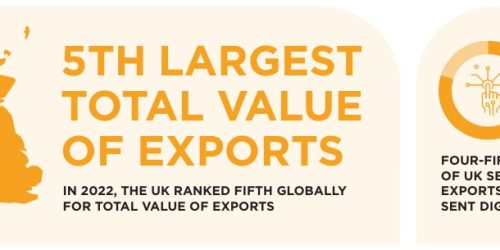10 UK Export News You Might’ve Missed – Week 18

In this edition of Export News from Expordite, we’ll cover the top 10 UK export news and headlines from week 18 of 2024 — April 29th-May 5th, 2024.
Key News
-
UKEF unveils plans to help exporters win £12.5 billion in new business by 2029
-
Government makes next set of crucial changes to improve biosecurity at UK’s trade border
General Export News
1. UKEF unveils plans to help exporters win £12.5 billion in new business by 2029
“British businesses are set to benefit from billions of pounds of new exporting opportunities in a further boost to the UK economy under plans published today by UK Export Finance (UKEF).
Ministerial government department UKEF is the country’s export credit agency (ECA), helping businesses access finance and insurance to support their overseas trade ambitions.
Its new 2024-29 Business Plan includes a commitment to help companies across the United Kingdom win over £12.5 billion in new contracts by 2029, as well as unlocking £5 billion of investment into their UK operations.
UKEF will continue to promote the role of UK exports in creating sustainable growth overseas. It aims to secure £10 billion in financing for UK exports to low and middle-income countries over the next five years, driving UK-led improvement of infrastructure and governance in developing markets while supporting British jobs.“
Source: GOV.uk
2. Government makes next set of crucial changes to improve biosecurity at UK’s trade border
“Today the Government is making crucial changes to the way the UK imports food, animal and plant products in order to improve our biosecurity.
Products which present a ‘medium’ risk to our biosecurity will now undergo identity and physical checks, which test for pests and diseases that could impact the safety of our food and harm our natural environment. Checks involve visual inspections and temperature readings of goods.
Additionally, ‘high risk’ goods will now be checked at the border, where before they were checked at destination.“
Source: GOV.uk
3. Scottish firms win in first UK Export Finance deal for oil and gas decommissioning.
“UK Export Finance (UKEF) has closed its first ever transaction supporting overseas oil and gas decommissioning, securing finance for a major contract which benefits over 70 Scottish firms.
The export credit agency has issued a $7.5 million guarantee which allows Brazilian contractor Ocyan to secure financing from ABC International Bank plc for new equipment from Scottish business Maritime Developments Ltd (MDL).
Based in Aberdeen, MDL is a specialist in subsea pipelaying which provides consultancy, equipment and personnel to the energy sector. It won the 2022 Queen’s Award for Enterprise in the International Trade category.
Supported by early-stage discussions with UKEF, Ocyan ordered MDL equipment in 2022 so that it could deliver a decommissioning contract in Brazil. Ocyan has since used the Scottish company’s Wheeled Horizontal Lay System technology to remove hundreds of kilometres of subsea cables and pipes from defunct FPSO oil and gas rigs in Brazilian waters. “
Source: GOV.uk
4. The UK has become the world’s fourth largest exporter, but can it maintain this momentum?
“UK business is beaming with pride with the recent news of the country’s emergence as the fourth largest exporter in the world based on the United Nations Conference on Trade and Development report. The UK jumped three places in 2022, surpassing France, the Netherlands and Japan.
This pride is justified, as there have been many challenges along the way, especially in the wake of Brexit, when the UK found itself redefining its economic landscape. With the dust settling from its EU departure, combined with COVID disruption, the UK was embarking on an uncertain journey.
Right now, the UK government is trying to drive expansion in exports in response to global economic opportunities, and challenges like navigating new trade barriers and customs procedures, increased bureaucracy and logistical issues. Yet, the country has remained resilient, negotiating with old and new trading partners.“
Source: The Conversation
5. Animal Welfare (Livestock Exports) Bill undergoes further Lords scrutiny
“Members of the House of Lords begin their further examination of the Animal Welfare (Livestock Exports) Bill, in report stage on Wednesday 8 May.
The Animal Welfare (Livestock Exports) Bill seeks to end the export of certain animals for fattening and slaughter from and through England, Wales and Scotland.
Source: UK Parliament
6. ‘Brexit trade checks will cost me £200,000 a year’
“New checks brought in under the UK’s Brexit trade agreement will cost one business up to £225,000 a year, its co-owner has said.
Meat and dairy products, plants and seeds are among the goods now subject to physical checks when imported to Britain from the European Union from Tuesday.
Businesses have warned the trade checks, which will see import costs increase immediately, are expected to hit smaller companies hardest and lead to price rises being passed on to customers for certain products.
John Davidson, co-owner of flower company Tom Brown Wholesale, said he expected the checks to cost his business between £200,000 and £225,000 per year.“
Source: BBC News
7. UK gov’t recognises “unique” needs of HE, says minister, ahead of MAC deadline
“The UK’s minister for exports has assured UK stakeholders of the government’s commitment and understanding of international students and their impact, but not everyone is convinced.
As stakeholders eagerly await the findings of the Migration Advisory Committee’s review into the Graduate Route on May 14, and the governments subsequent policy decision, Lord Offord of Garvel, minister for exports, addressed delegates at the 2024 International Higher Education Forum, organised by Universities UK.
“I wish to assure you that that while appropriately examining the Graduate Route, we also recognise in government that international students have a significant impact, not only on the local economies, but also on the student experience of their fellow classmates and indeed on the UK’s reputation around the world,” Offord told the audience.
Education as an export currently sits at £28bn, explained Offord, noting that while other exports have “ebbed and flowed”, education has continued to race ahead.“
Source: The Pie News
8. Russia’s impact on global food security: UK statement to the OSCE
“The UK would like to thank the chair for dedicating a session to this theme, which is timely. Food production and agriculture cause extensive nature loss and greenhouse gas emissions. Pressure is mounting to urgently develop more resilient food systems that benefit people, planet and prosperity.
The UK recognises the scale of the challenge. Our long-standing funding of CGIAR, the world’s leading agricultural science and innovation organisation, has helped millions of farmers to increase the resilience of their crops. Our investment in the Global Agriculture and Food Security Program has helped over 18 million smallholder farming households, including across Central Asia. And our support for the Agriculture Breakthrough will accelerate development of clean technologies and sustainable solutions in the agriculture sector.
One of the tragic results of Russia’s unjustified and illegal invasion of Ukraine has been the impacts on global food security. Over two years of war have seen agriculture costs increase, while landmines have reduced the amount of land available to farm.
In response, the UK has worked closely with Ukraine and others to ensure Ukraine can continue to export its grain. We have worked with Ukraine to secure the temporary maritime corridor, including by providing equipment and preventing and deterring Russian attacks. The ‘Unity Facility’, developed by Ukraine and a UK-based insurer, has been key in reducing insurance premiums for commercial shipping using the corridor. “
Source: GOV.uk
9. 56% drop in poultry meat exports calls for SPS agreement – BPC
“A 56% drop in poultry meat exports since 2020 underscores the erosion of British poultry supply chains due to Brexit, and shows the need for a Sanitary and Phytosanitary (SPS) agreement.
This is the view of the British Poultry Council (BPC), which said that certification alone has cost exporters £55 million a year since January 1, 2021.
Meanwhile, the national trade group for the UK poultry meat industry said importers have enjoyed a competitive advantage, paying £0 since controls have been delayed five times in two years.
However, imports of poultry meat continue to rise, with the UK bringing in nearly 675,000t from the EU, valued at over £2 billion.“
Source: Agriland
10. NZ/EU FTA ‘unlikely’ to pose threat to UK agri exports – AHDB
“The New Zealand/EU free trade agreement (FTA) is “unlikely to pose a threat” to UK exports, the Agriculture and Horticulture Development Board (AHDB) has said.
The FTA, which came into force yesterday (Wednesday, May 1), improves access for New Zealand sheep meat, beef and dairy to the EU.
The EU is the second largest market for New Zealand sheep meat, with 54,000t of product shipped to the market last year.
AHDB senior economist, Jess Corsair, said: “There has been some concern aired in the industry that the NZ/EU FTA could result in a deluge of New Zealand sheep meat entering the EU market posing a threat to the UK export trade.
“Given the different products and markets of the UK and New Zealand, it would suggest that when the new FTA is in force, New Zealand product will not displace UK sheep meat exports to the EU.”“
Source: Agriland
Want to get more international trade content straight to your inbox?






